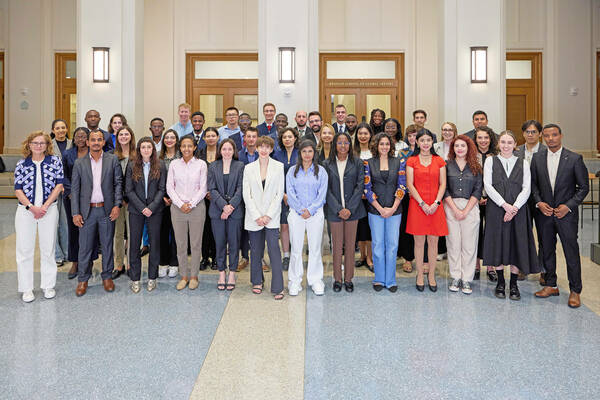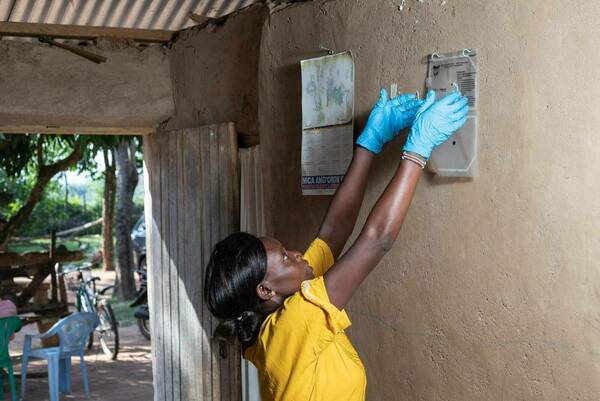Master of Global Affairs Class of 2026 arrives at Keough School
The 42 members of the Keough School’s Master of Global Affairs Class of 2026 have arrived at Notre Dame from 27 countries, bringing with them varied personal and professional backgrounds and a steadfast commitment to fostering human dignity around the globe.
“One of the most exciting aspects of the Keough School community is the energy, diversity and insightfulness brought each year by our incoming class of master of global affairs students,” said Dory Mitros Durham, assistant dean for academic affairs. “Our faculty and staff will do everything we can to equip them with the knowledge and skills they will need to address the world’s most pressing challenges, knowing that an equally valuable part of their Notre Dame education will be the insights they will gain from each other.”
The new class includes 11 students from Africa, eight from Asia, three from Europe, nine from Latin America, one from the Middle East and one from Oceania. Countries represented for the first time at the Keough School include Georgia, Israel, Malta, New Zealand, Sri Lanka and Tanzania. Three students have served in the U.S. military; three are recipients of Fulbright awards, and one is a returned Peace Corps volunteer. Fifteen students will pursue a concentration in governance and policy; 15 will earn a concentration in international peace studies, and 12 will pursue the sustainable development concentration.
Master of global affairs students receive generous fellowship support from several donor families, foundations and the institutes and centers within the Keough School, including the the Kroc Institute for International Peace Studies, the Kellogg Institute for International Studies, the Ansari Institute for Global Engagement with Religion, the Liu Institute for Asia and Asian Studies, the Nanovic Institute for European Studies and the McKenna Center for Human Development and Global Business.
The two-year Master of Global Affairs program prepares professionals for skilled, effective leadership and careers in government, nongovernmental and civil society organizations, and the private sector. The program will accept applications for fall 2024, beginning in September with all applications due December 15, 2024.
Welcome, Master of Global Affairs Class of 2026!
Latest Research
- NSF Cyber SMART’s fall meeting shapes fifth year of project, legacy and future plans, and adds new memberThe U.S. National Science Foundation (NSF) Cyber SMART center gathered for its fall meeting on the University of Notre Dame campus this September. The meeting served as a checkpoint with progress reports and new projects from research leads and students…
- Slavic and Eurasian studies professor wins Humboldt fellowship to research how Russia’s religious past shapes its presentWhen Russia invaded Ukraine on Feb. 24, 2022, Sean Griffin realized his second book needed a new title. Griffin, an associate professor in the University of Notre Dame’s Department of…
- Notre Dame’s R.I.S.E. AI Conference builds interdisciplinary collaboration to inform human-centered artificial intelligenceAs artificial intelligence (AI) transforms nearly every sector of society — from healthcare and education to governance and global development — a critical question emerges: How can we conscientiously design and deploy these powerful technologies to positively impact society? This…
- University of Notre Dame joins the Global Coalition of Ukrainian StudiesThe University of Notre Dame has joined the Global Coalition of Ukrainian Studies after signing a Memorandum of Cooperation (MOC), formalized on September 24, 2025, at the Ukrainian Institute of America in New York City. Notre Dame joined four other American…
- The University of Notre Dame’s Mendoza College of Business and Industry Labs team up to inspire national security manufacturing competitiveness in the regionThe South Bend - Elkhart Region is full of manufacturing companies that are poised to grow, and Executive Master of Business Administration (EMBA) and Master of Business Administration (MBA) students at the University of Notre Dame are finding innovative ways to contribute to that growth. Earlier…
- Notre Dame research informs WHO conditional recommendation for spatial repellents in malaria vector controlThe World Health Organization (WHO) recently announced a “conditional recommendation” for spatial emanators, also known as “spatial repellents,” in the fight against malaria. This key determination was informed by spatial repellent studies that included the Advancing Evidence for the Global Implementation of Spatial Repellents (AEGIS) Project in Kenya, led by the University of Notre Dame and funded by Unitaid. The findings from this particular study were recently published in The Lancet.













